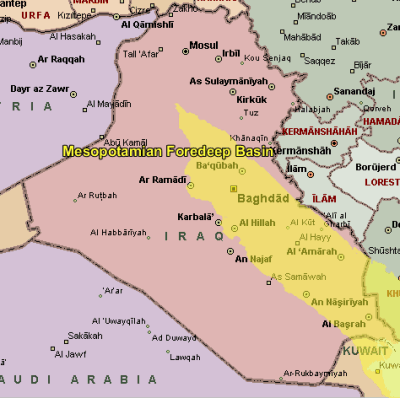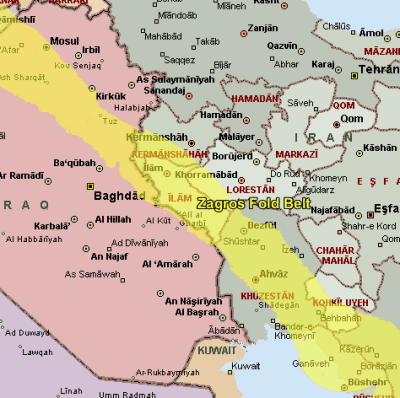US/Iraq/War: An Axis of Oil
www.republicons.org
by: Erik P Sorensen
Republicons.org
3/19/2003
The numbers are remarkably stark, and they have yet to be expunged from the USGS website. In its World Petroleum Assessment 2000 the U.S. Geological Survey analyzes, in painstaking detail, the existing global oil reserves, known and inferred from geological analysis. It states that more than two thirds of the world´s remaining recoverable oil reserves are in the Arabian and Persian Gulf region, certainly no surprise. However, the USGS asserts that fully 95% of all known petroleum can be found outside the U.S.
The final analysis of this formerly Fertile Crescent is telling. The USGS subdivided the Persian Gulf region into geological “provinces”, an appropriate colonial term, each with specific characteristics. Of the 28 provinces in this region the one cited as having the greatest percentage of known petroleum was the “Mesopotamian Foredeep Basin”. With 13.8% of the world’s known petroleum volume, this province just happens to be located primarily in Iraq (see inset map).


How much oil does this narrow swath of land have? Well, according to USGS approximations, the basin possesses over 61 billion barrels of as yet undiscovered oil, maybe as much as 112 billion barrels. To put that in context, the rosy analysis of the amount of gross volume output from the Arctic National Wildlife Refuge was around 6.7 billion barrels, and that was inclusive of known and unknown sources. Not to mention that the Persian Gulf oil reserves are more accessible and there already exists a robust infrastructure for cheap global distribution.
But wait, there’s more. Which province ranks third in this region with 7.6% of global oil reserves? It is none other than the Zagros Fold Belt province that comprises part of Iraq and part of Iran (see inset).
In fact, when these two regions are coupled, which they are in several references within the USGS survey (as the “Zagros-Mesopotamian Cretaceous-Tertiary Total Petroleum System”) it becomes the prospective source of over 21% of the total global petroleum reserves.
So, what could be the prospective motivation for military upheaval in Iraq and isolation of a moderating Iranian leadership? The conclusion is painfully clear. The inclusion of North Korea in the “Axis of Evil” was merely a red herring (and I do mean “red”). And it appears as if Kim Jong Il saw this chimera and has called Bush's bluff. We have witnessed the disparate treatment of actors within this alleged Axis; Iraq professes to not possess weapons of mass destruction (thus far borne true by Hans Blix) and has troops massing at its border while North Korea has flaunted its capacity to build nuclear weapons and flouted the Nuclear Non-proliferation Treaty yet has been handled with care.
Let’s return to the USGS assessment for some insight. The USGS deemed the entire Korean peninsula as neither a “priority” nor even a “boutique” province for assessment. A boutique province is defined as a “perceived viable future petroleum resource.” Good fortune to Mr. Kim.
So is there a third leg to this axis of oil? You bet there is. The USGS reports that Venezuela has an additional 20-40 billion barrels of oil and between 50,000 and 100,000 billion cubic feet of natural gas undiscovered. Of course, it would have been unseemly to include a leader among the Axis of Evil who was popularly elected (unlike some rulers we know). But, as we have learned, this has not prevented the Bush administration from embracing an attempt to overthrow Hugo Chavez by the rich. Ari Fleischer offered this support of democratic transition on April 12, 2002 in the aftermath of the coup attempt, “We know that the action encouraged by the Chavez government provoked this crisis… The results of these events are now that President Chavez has resigned the presidency.” The latter statement was, of course false. Now, the business interests and their labor lackeys in Venezuela hold the economy hostage and Bush’s solace; encourage Chavez to resign or call early elections.
Not being a conspiracy theorist, I believe things are actually as bad as they are, I see no multinational world domination scheme to enslave Americans. The reality is that Bush and Cheney are beholden to the oil industry for their very existence and see it as their solemn oath to uphold industry interests at all costs. The long term consequences of U.S. domination of the assets of the Persian Gulf, however, could be devastating. The Saudi’s ambivalent amity toward the U.S. has already fomented such dire enmity for America as to spawn Osama Bin Laden and his minions, imagine the pestilent seeds that could be sewn by direct occupation.
For more information visit: greenwood.cr.usgs.gov